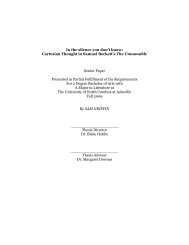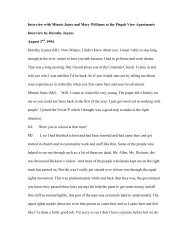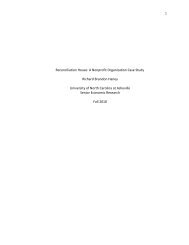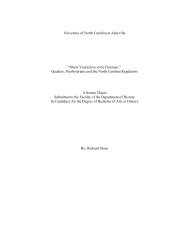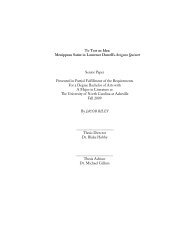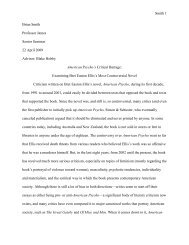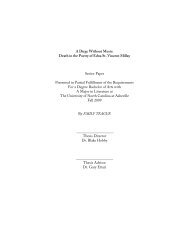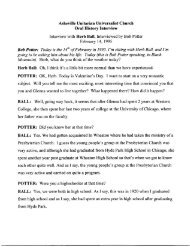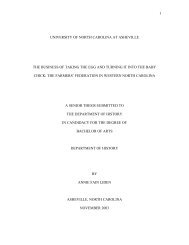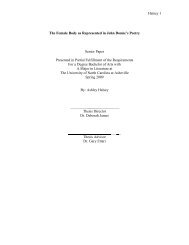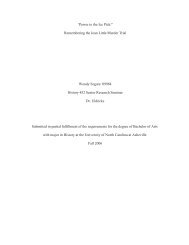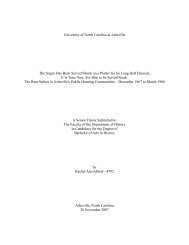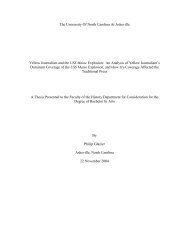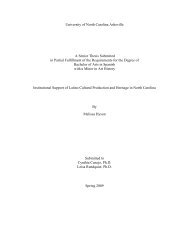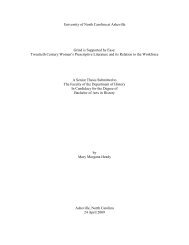Mark Twain's Writing During his Last Twenty Years: The Conflicts of ...
Mark Twain's Writing During his Last Twenty Years: The Conflicts of ...
Mark Twain's Writing During his Last Twenty Years: The Conflicts of ...
Create successful ePaper yourself
Turn your PDF publications into a flip-book with our unique Google optimized e-Paper software.
Arghiere 6<br />
1908, another <strong>of</strong> Twain’s daughters, who had recently developed epilepsy, drowned while<br />
bathing. Shorty after t<strong>his</strong>, another daughter, with whom Twain had a stormy relationship,<br />
suffered a nervous collapse (“Clemens, Samuel Langhorne” 61).<br />
Many critics and biographers believe that Twain felt guilt, as well as sorrow, surrounding<br />
these events. Twain, they suggest, felt that he could have done more to prevent the death <strong>of</strong> <strong>his</strong><br />
daughter in 1896, as <strong>his</strong> financial troubles, which forced him to embark on several worldwide<br />
lecture tours, were the ultimate reason that he decided to stay abroad rather than return home to<br />
be with <strong>his</strong> daughter during her illness (Covici 551). <strong>The</strong> choice to continue <strong>his</strong> lecture tour, as<br />
Harold Bush Jr. writes in <strong>his</strong> essay “‘Broken Idols’: <strong>Mark</strong> Twain’s Elegies for Susy and a Critique<br />
<strong>of</strong> Freudian Grief <strong>The</strong>ory,” was “one <strong>of</strong> the many decisions that [Twain] would bitterly regret for<br />
the rest <strong>of</strong> <strong>his</strong> life” (238). Twain’s regrets, as <strong>his</strong> daughter Clara Clemens notes in her book My<br />
Father, <strong>Mark</strong> Twain (1931), were compounded by <strong>his</strong> inclination to place blame on himself:<br />
“Self-condemnation was the natural turn for <strong>his</strong> mind to take, yet <strong>of</strong>ten he accused himself <strong>of</strong><br />
having inflicted pain or trouble when the true cause was far removed from himself” (Robinson<br />
145). As <strong>his</strong> tendency to place blame on himself suggests, Twain <strong>of</strong>ten showed a deep concern<br />
for the moral repercussions <strong>of</strong> <strong>his</strong> actions.<br />
Critics sometimes attribute Twain’s strong sense morality, as well as <strong>his</strong> sorrow and sense<br />
<strong>of</strong> guilt, to the bitter and deterministic tone <strong>of</strong> <strong>his</strong> later writing. Twain’s moral principles,<br />
exemplified notably by <strong>his</strong> defense <strong>of</strong> social justice, racial equality, and human and animal welfare,<br />
are evident both in <strong>his</strong> writing and <strong>his</strong> reputation. In <strong>The</strong> Prince and the Pauper, <strong>The</strong> Adventures <strong>of</strong><br />
Huckleberry Finn, <strong>The</strong> Tragedy <strong>of</strong> Pudd’nhead Wilson (1894), and even many <strong>of</strong> <strong>his</strong> works from<br />
1895 onwards, Twain questions and criticizes cruel and immoral social practices and patterns in<br />
human behavior. Because <strong>of</strong> <strong>his</strong> social criticism and social activism, Twain acquired the monikers



